Sports
Snowboarder Quickly Learns Why Riding Across A Cornice Is A Bad Idea


 cornices build on wind exposed ridges and summits, suddenly breaking off with little warning. They can be triggered from a distance, too, easily triggering slab avalanches on slopes below.
cornices build on wind exposed ridges and summits, suddenly breaking off with little warning. They can be triggered from a distance, too, easily triggering slab avalanches on slopes below.” data-image-caption=”Cornices can be incredibly hazardous features in backcountry travel. As the winter goes on, cornices build on wind exposed ridges and summits, suddenly breaking off with little warning. They can be triggered from a distance, too, easily triggering slab avalanches on slopes below.
” data-medium-file=”https://i0.wp.com/unofficialnetworks.com/wp-content/uploads/2025/01/cornice.jpg?fit=1280%2C1045&ssl=1″ data-large-file=”https://i0.wp.com/unofficialnetworks.com/wp-content/uploads/2025/01/cornice.jpg?fit=1340%2C1094&ssl=1″>
Overhung cornices often reach much further back than expected, stretching onto flat ridges and catching travelers by surprise. They can be quite destructive on their own, even the smaller ones, and their ability to trigger avalanches below make them even more of a hazard. Travel on corniced ridge lines should be done cautiously to avoid situations like the one below.The Colorado Avalanche Information Center, avoiding cornices is a necessary step to traveling safely in the backcountry. A probe can be used to determine the existence of real, hard ground underneath snow if necessary. Additionally, areas underneath cornices should be avoided, given their ability to trigger large avalanches and the ability for larger cornices to easily crush a human.
Snowboarder caught in a cornice fall.
Watch
Sports
Ferris State provides early commencement celebration for two volleyball team members headed to NCAA DII Elite Eight
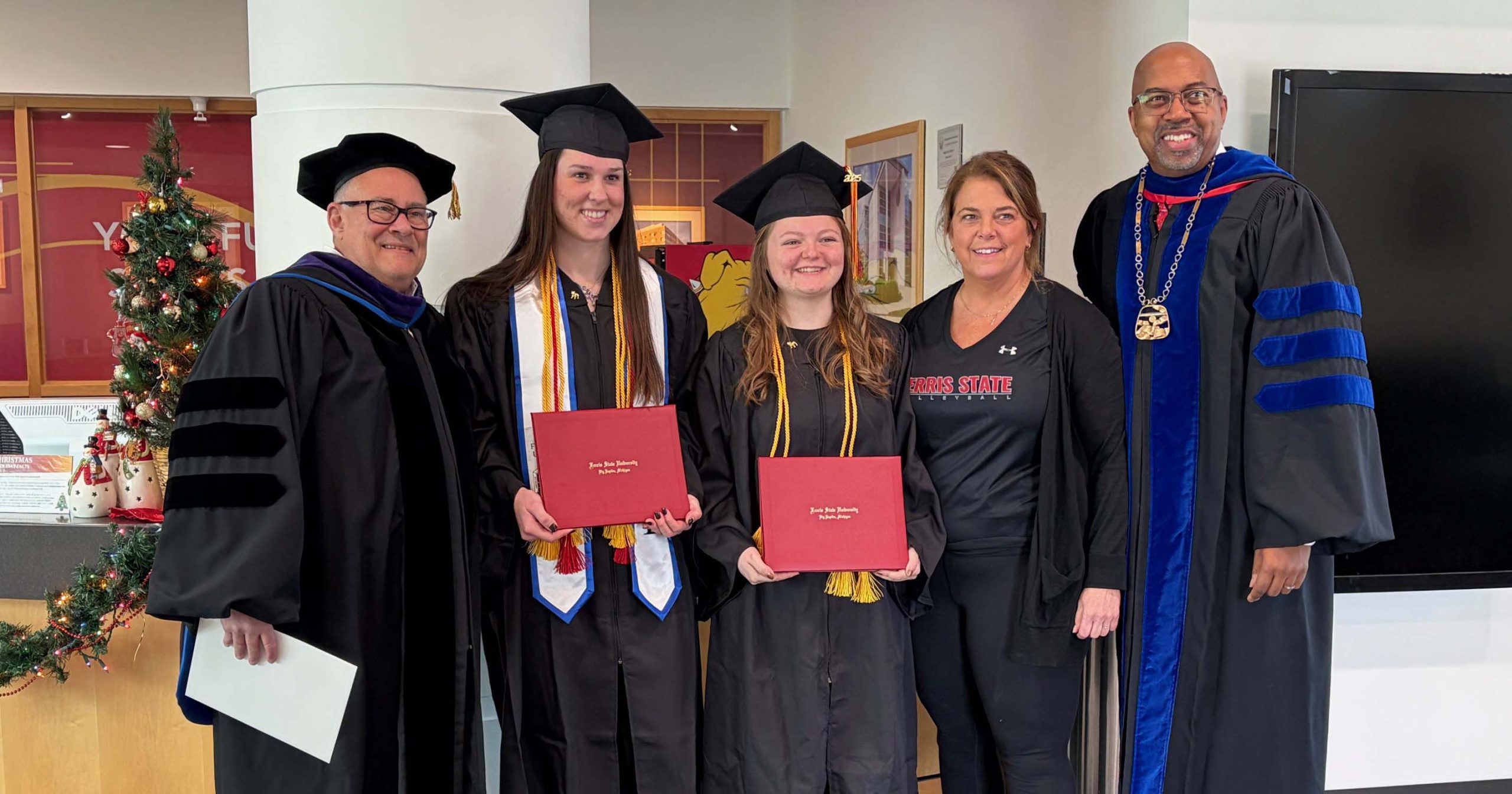
December 8, 2025
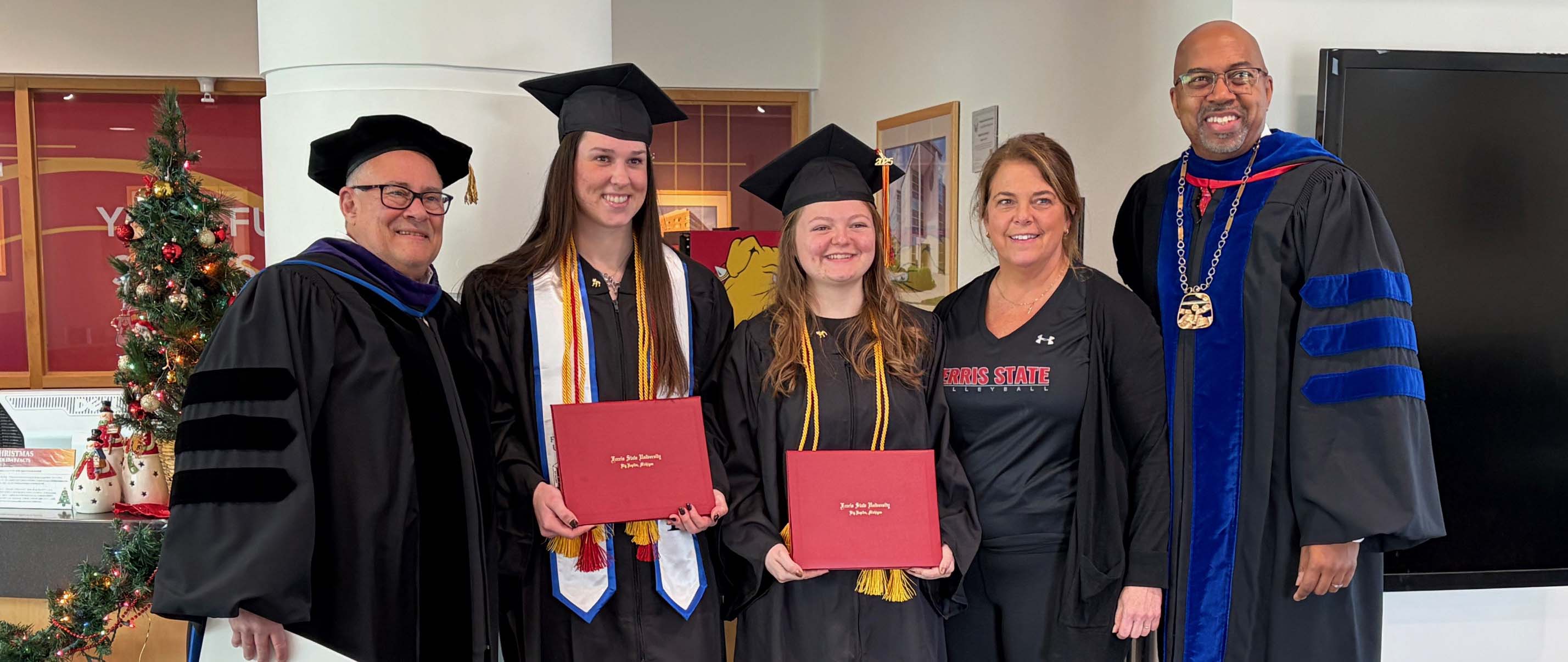
Tia Brandel-Wilhelm, and President Bill Pink
BIG RAPIDS, Mich. —
Two members of the Ferris State University volleyball team has one important thing
to take care of before heading to South Dakota for the NCAA Division II National Tournament:
graduate.
Ferris State President Bill Pink and Provost Bobby Fleischman conducted a special
ceremony for outside hitter Emma Bleecher and Ivy Wilhelm, a student worker with the
team, complete with academic regalia. The team members won’t be back from the tournament
in time to participate in Friday’s ceremony with their classmates.
“We do this because we like to celebrate our Bulldogs,” Pink said. “We like to celebrate
our graduates, and when you’re not able to join us for all the good reasons. When
your success is so prominent in our university, these things happen. But that’s why
our university is built to adjust so that we’re able to help our students.”
The volleyball team earned its way to the NCAA DII Elite Eight for the second year
in a row. Pink said he didn’t want the students’ athletic success to prohibit them
from participating in a treasured academic milestone.
“We’re used to this kind of success,” Pink told the students. “It’s how we do our
business here at Ferris State. We make sure that we honor and recognize when our students
have accomplishments. Our students finish what we start. So, it’s an honor to be able
to celebrate with you this way.”
Students wore their caps and gowns for the brief celebration. Bleecher, a Criminal
Justice Administration major from Champaign, Illinois said it was nice to be able
to be presented with her diploma even if she couldn’t be a part of the larger ceremony
on Friday morning.
“I think it’s amazing,” she said. “I think it’s just like a blessing to be here, and
it’s just cool to be able to do both.”
Wilhelm, who works with the team’s social media, earned a bachelor’s degree in Marketing.
“In moments like this, when I know it’s my community and they’re going to show up
for me, I know 100% I was right to be here these four years,” she said.
The team captured the NCAA DII Midwest Region Championship on Saturday and has been
selected as the No. 8 seed Elite Eight rounded to be held Dec. 11 to 13, in Sioux
Falls, South Dakota.
The Bulldogs will square off against top-seeded and unbeaten University of Tampa in
the national quarterfinals on Thursday, Dec. 11 with first serve set for 8 p.m. at
the Sanford Pentagon.
The Bulldogs will be making their second consecutive NCAA Division II Elite Eight
appearance after making their first since 2013 a year ago.
Saturday’s victory marked the fifth time Ferris State claimed a regional championship
as the Bulldogs previously won crowns back in 1987 and 1989 along with 2013 and 2024.
Ferris State, which is guided by 30th-year head coach Tia Brandel-Wilhelm, is 27-7
this year heading into the D2 Elite Eight. The Bulldogs finished the regular season
as the GLIAC Champions and earned runner-up honors in the GLIAC Tournament as the
host institution.
Sports
Wildsmith Earns USTFCCCA National Weekly Nod
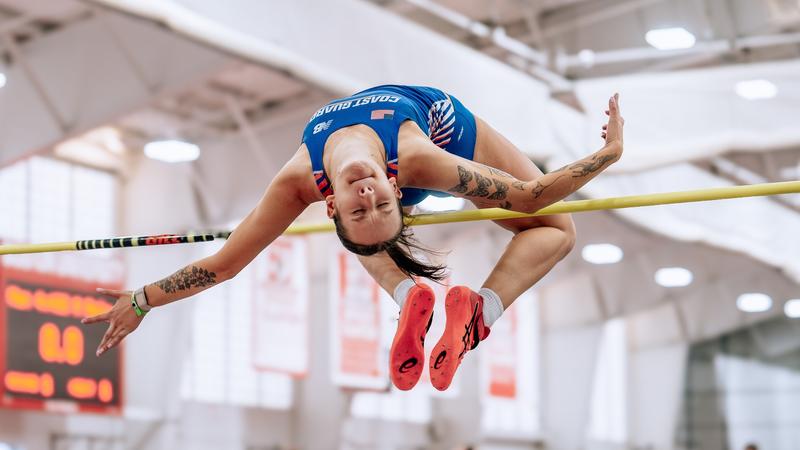
GRAPEVINE, Tex. —
Allie Wildsmith (Bainbridge Island, Wash.) of the U.S. Coast Guard Academy track & field team has been named the United States Track & Field and Cross Country Coaches Association (USTFCCCA) Women’s NCAA Division III National Athlete of the Week in recognition of her performance this past weekend at Boston University’s Sharon Colyear-Danville Season Opener.
The reigning indoor and outdoor high jump National Champion wasted started her first title defense of the season by needing just two jumps to win the event. Wildsmith passed up on the first five bars before clearing her first attempt of the day at 1.63 meters (5′ 4.25″). The senior needed just one jump again to get over the next height of 1.68m (5′ 6″), which the remaining three of her original five competitors bowed out on.
As the last jumper left, Wildsmith secured easy one-try clearances on the next two heights of 1.73m (5′ 8″) and 1.78m (5′ 10″) before closing out her day with tries at the NCAA DIII indoor record of 1.83m (6′ 0″). Despite knocking the bar off on all three tries, the senior’s dominance was on full display as she extended her undefeated streak to 11 event wins in a row.
Wildsmith and Bears track & field will be out of action for the next few weeks due to the holiday break, but they’ll be back and raring to go on January 17th for the self-hosted CGA Winter Invite #1 at Gregory Field House.
Sports
VYPE HOU 2025 Volleyball Setter of the Year Fan Poll

Sports
Central’s Brown named conference men’s runner of the week
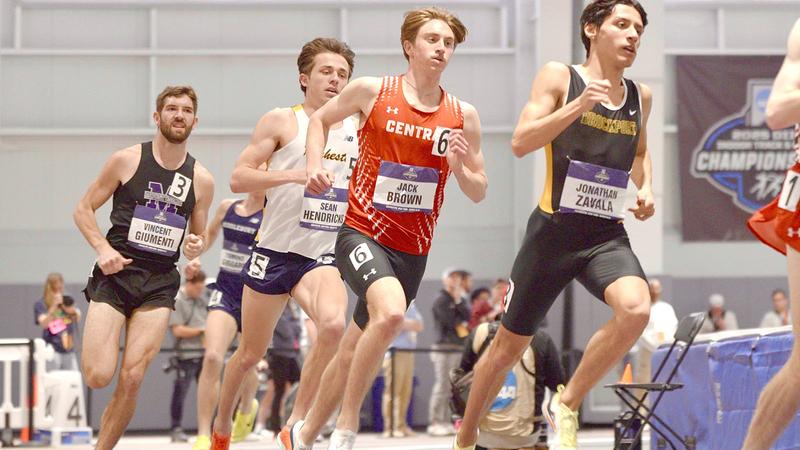
PELLA— Winning the mile in his first action of the indoor season, Central College men’s track and field junior Jack Brown (Norwalk) was named the American Rivers Conference Track Events Performer of the Week Monday.
Brown’s mile time clocked in at 4 minutes, 7.80 seconds at the Frigid Bee Opener hosted by St. Ambrose University on Saturday. He won the race by 4.87 seconds and currently has the top time in Division III.
Central hosts the Dutch Holiday Preview on Friday, December 12 inside the H.S. Kuyper Fieldhouse.
Sports
Limestone’s Mia Lamberti repeats as Volleyball Player of the Year
Dec. 9, 2025, 3:00 a.m. CT

Limestone High School junior Mia Lamberti is the 2025 Journal Star Volleyball Player of the Year, the second year in a row for the University of Illinois commit.
MATT DAYHOFF/JOURNAL STAR

Limestone junior Mia Lamberti repeats as the Journal Star Volleyball Player of the year. The University of Illinois commit helped lead the Rockets to a 34-3 record and Mid-Illini Conference Championship.
MATT DAYHOFF/JOURNAL STAR

Limestone junior Mia Lamberti is the Journal Star Volleyball Player of the Year for the second year in a row.
MATT DAYHOFF/JOURNAL STAR

Limestone junior and University of Illinois commit Mia Lamberti repeats as the Journal Star Volleyball Player of the Year.
MATT DAYHOFF/JOURNAL STAR
Limestone’s Mia Lamberti, right, spikes the ball against Morton’s Harper Strube in the first set of their high school volleyball match Thursday, Sept. 18, 2025 in Morton. The Rockets took the match in three sets 25-15, 20-25, 25-21.
MATT DAYHOFF/JOURNAL STAR
Limestone’s Mia Lamberti spikes the ball against Morton in the third set of their high school volleyball match Thursday, Sept. 18, 2025 in Morton. The Rockets took the match in three sets 25-15, 20-25, 25-21.
MATT DAYHOFF/JOURNAL STAR
Limestone’s Mia Lamberti tries to put the ball past Washington’s Haley Ashley in the second set of their Class 3A volleyball regional title match Thursday, Oct. 30, 2025 at Washington Community High School. The Panthers upset the Rockets in straight sets 25-23, 25-23.
MATT DAYHOFF/JOURNAL STAR
Sports
FSC Athletics Update – December 8

FARMINGDALE, N.Y. | The Skyline Conference released its weekly winter reports Monday, and Farmingdale State College men’s basketball junior forward Kentrell Evans (Brooklyn, N.Y.) was tabbed to its honorable mention listing.
SAAC Toys for Tots Drive Wraps Up This Week
The Farmingdale State College Student-Athlete Advisory Committee’s annual Toys for Tots Drive continues this week, with collection boxes set up in the Nold Hall lobby through the coming weekend. Students, faculty, staff and fans are encouraged to donate new, unwrapped toys for the annual initiative conducted nationwide by the United States Marine Corps, including Wednesday’s men’s basketball game versus Swarthmore at 7 p.m., along with Saturday’s noontime women’s basketball contest against Old Westbury.
Men’s Basketball (6-2) | Skyline Report
Farmingdale State registered an 86-76 road win Wednesday at SUNY New Paltz, before falling at national finalist NYU on Saturday afternoon, 84-68.
Evans averaged 17 points and 10 rebounds per game during the stretch, including a double-double in Wednesday’s victory over the Hawks and a career-high 18 points on the weekend against the Violets, while shooting 70 percent (14-of-20) from the field.
Following Wednesday’s 7 p.m. non-conference tilt at home versus Swarthmore College, the Rams will begin Skyline play on the road Saturday in a noontime start at Old Westbury.
Women’s Basketball (3-4, 2-3 Skyline) | Skyline Report
FSC dropped a 66-64 decision at home Wednesday night to Skyline foe Purchase College, before capturing a 64-56 win Saturday at defending conference champion Mount Saint Mary – the Rams’ first victory over the Knights since 2017.
Senior point guard Shyann Parker (Floral Park, N.Y.) scored a career-high 25 points midweek against Purchase, before junior guard Mia Simmons (Queens, N.Y.) led the Rams with 16 in Saturday’s triumph.
Following Tuesday’s 6 p.m. Skyline game at Mount Saint Vincent, Farmingdale State will play host to Old Westbury on Saturday at noon.
Indoor Track and Field
Farmingdale State’s men’s and women’s indoor track and field teams got underway Friday at the Fastrack Season Opener in Staten Island, with junior men’s thrower Adonias Mercado (Hillsdale, N.Y.) recording a first-place effort in the shot put with a mark of 15.86m (52-0.5). His effort was good for the second-best mark in school history.
The Rams next compete Friday and Saturday in New Haven, Conn., at the Art Kadish Elm City Challenge.
-

 Rec Sports2 weeks ago
Rec Sports2 weeks agoFirst Tee Winter Registration is open
-

 Rec Sports2 weeks ago
Rec Sports2 weeks agoFargo girl, 13, dies after collapsing during school basketball game – Grand Forks Herald
-

 Motorsports2 weeks ago
Motorsports2 weeks agoCPG Brands Like Allegra Are Betting on F1 for the First Time
-
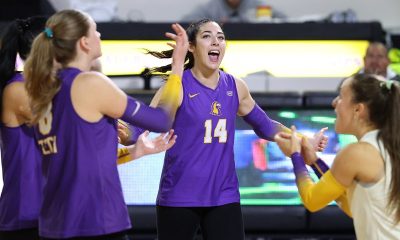
 Sports3 weeks ago
Sports3 weeks agoVolleyball Recaps – November 18
-

 Motorsports2 weeks ago
Motorsports2 weeks agoF1 Las Vegas: Verstappen win, Norris and Piastri DQ tighten 2025 title fight
-

 Sports2 weeks ago
Sports2 weeks agoTwo Pro Volleyball Leagues Serve Up Plans for Minnesota Teams
-

 Sports2 weeks ago
Sports2 weeks agoUtah State Announces 2025-26 Indoor Track & Field Schedule
-

 Sports2 weeks ago
Sports2 weeks agoSycamores unveil 2026 track and field schedule
-

 Motorsports2 weeks ago
Motorsports2 weeks agoRedemption Means First Pro Stock World Championship for Dallas Glenn
-

 Sports2 weeks ago
Sports2 weeks agoTexas volleyball vs Kentucky game score: Live SEC tournament updates






















































